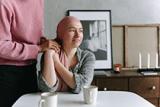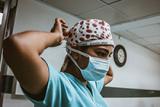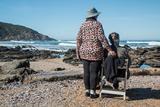The Umbrella and the Kitchen Table: Providing Safe, Supportive Care for Cancer Patients

Introduction and discussion of supportive care programs in a "home away from home" for patients during their cancer journey.
Category
- Patient Centered Care
Format
- Self-Paced, Online Courses
Credits
- 1.00 ACPE Pharmacist
- 1.00 ACPE Pharmacy Tech
- 1.00 CTR
- 1.00 NCPD/CNE
- 1.00 Participation
Immune (check point) Related Adverse Events - SPOC

Frances Collichio, MD, reviews the common and uncommon side effects of immune check point inhibitors. She also discusses the relatively new concept of delayed immune related events.
Category
- Research to Practice
Format
- Self-Paced, Online Courses
Credits
- 1.00 ACPE Pharmacist
- 1.00 ACPE Pharmacy Tech
- 1.00 AMA PRA Category 1 Credit™
- 1.50 ASRT
- 1.00 CTR
- 1.00 NCPD/CNE
- 1.00 Participation
Primary Brain Tumors: Diagnosis and Management Strategies - SPOC

Dominique Higgins, MD, PhD, provides an overview of diagnostic criteria for primary CNS brain tumors, and the current approved and investigational treatments that are available and on the horizon.
Category
- Research to Practice
Format
- Self-Paced, Online Courses
Credits
- 1.00 ACPE Pharmacist
- 1.00 ACPE Pharmacy Tech
- 1.00 AMA PRA Category 1 Credit™
- 1.25 ASRT
- 1.00 CTR
- 1.00 NCPD/CNE
- 1.00 Participation
Oncologic Emergencies - SPOC

Jacob Stein, MD, MPH, reviews several of the most common medical emergencies that arise when caring for patients with cancer. We highlight key aspects of presentation, diagnosis and management, with pearls for clinicians along the way.
Category
- Patient Centered Care
Format
- Self-Paced, Online Courses
Credits
- 1.00 ACPE Pharmacist
- 1.00 ACPE Pharmacy Tech
- 1.00 AMA PRA Category 1 Credit™
- 1.50 ASRT
- 1.00 CTR
- 1.00 NCPD/CNE
- 1.00 Participation
Integrating Germline Pharmacogenomic Testing into Oncology Care

Patients undergoing treatment for cancer utilize many medications that have relevant drug-gene interactions. The use of pharmacogenomic testing can assist with drug selection, drug dosing, and the development of personalized medication monitoring plans. Amber Cipriani, PharmD, BCOP, will describe some common examples of drug-gene interactions relevant to oncology. She will also discuss current efforts to expand the use of pharmacogenomic testing into current clinical practice.
Category
- Advanced Practice Provider
Format
- Self-Paced, Online Courses
Credits
- 1.00 AMA PRA Category 1 Credit™
- 1.00 NCPD/CNE
- 1.00 Participation
Physical Therapy Approaches to Oncology Care: Beyond Lymphedema

Tailored for medical providers, this session led by a physical therapist addresses challenges like speech and swallowing difficulties or pelvic floor issues in gynecological cancer. Explore the pivotal role of physical therapy in survivorship care plans and delve into current research supporting interventions for head and neck, gynecological, breast cancer, and other oncological conditions. Emphasizing interdisciplinary collaboration, we'll discuss the synergy between medical providers and physical therapists in delivering optimal cancer care. Additionally, learn the art of patient education in oncology rehabilitation, empowering medical providers to effectively communicate the role of physical therapy in cancer care.
Category
- Advanced Practice Provider
Format
- Self-Paced, Online Courses
Credits
- 1.00 AMA PRA Category 1 Credit™
- 1.00 NCPD/CNE
- 1.00 Participation
Integrating the Caregiver as a Member of the Multidisciplinary Care Team - SPOC

Erin Kent, PhD, MSc, and Loretta Muss, RN, BA, discuss how to recruit the caregiver into the patient’s plan of care and understanding the role and the stresses of being an oncology caregiver.
Category
- Patient Centered Care
Format
- Self-Paced, Online Courses
Credits
- 1.00 ACPE Pharmacist
- 1.00 ACPE Pharmacy Tech
- 1.00 ASRT
- 1.00 CTR
- 1.00 Participation
Solid Organ Transplantation and Skin Cancer

Puneet Singh Jolly, MD, PhD discusses keratinocyte neoplasms are by far the most common malignancy in the world. While surgical treatments remain the most common and most effective therapy, there are numerous emerging non-surgical techniques. We discuss these and the rationale for using such treatments, particularly in specific challenging clinical scenarios.
Category
- Patient Centered Care
Format
- Self-Paced, Online Courses
Credits
- 1.00 ACPE Pharmacist
- 1.00 ACPE Pharmacy Tech
- 1.00 AMA PRA Category 1 Credit™
- 1.00 ASRT
- 1.00 CTR
- 1.00 NCPD/CNE
- 1.00 Participation
Prostate Cancer 101 - GU Oncology Nursing Education - Part 1
In this course, Mary Dunn, MSN, RN, NP-C, OCN, will provide a general overview of Prostate Cancer. The audience will learn about basic pathophysiology and epidemiology as it relates to both local and advanced disease. This course will then provide insight into the pros & cons of prostate cancer screening as well as the accepted diagnostic procedures & scoring.
Category
Format
- Self-Paced, Online Courses
Credits
- 0.75 NCPD/CNE
- 1.00 Participation
Prostate Cancer 101 - GU Oncology Nursing Education - Part 2
In this course, Mary Dunn, MSN, RN, NP-C, OCN, will go into more detail for treatment options and considerations for treating localized prostate cancer and the management of side effects.
Category
Format
- Self-Paced, Online Courses
Credits
- 0.75 NCPD/CNE
- 1.00 Participation

 Facebook
Facebook Twitter
Twitter LinkedIn
LinkedIn Forward
Forward